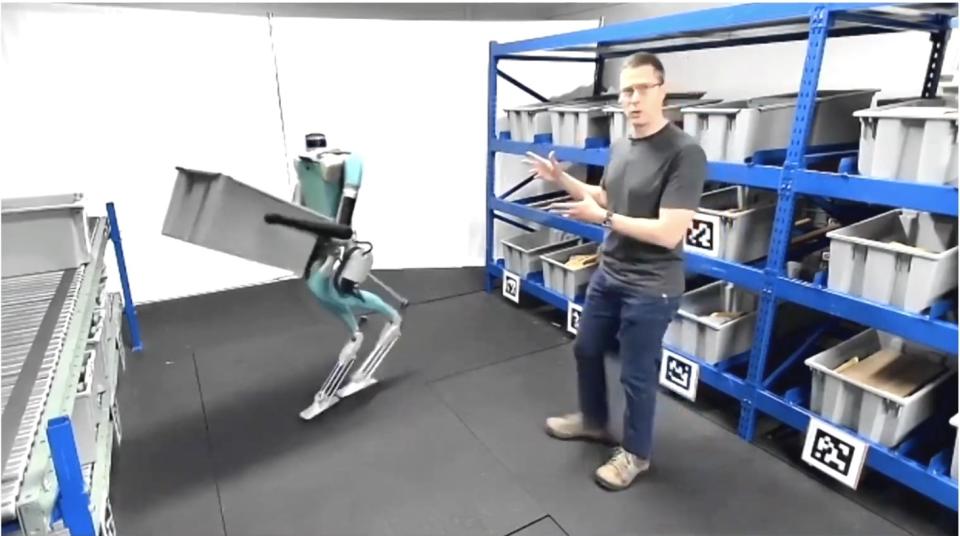Agility's next Digit robot will have a face and hands

Digit, the bipedal robot developed by Agility Robotics, will continue to evolve and improve, including the addition of a head and some digits of its very own, according to co-founders Damion Shelton and Jonathan Hurst.
Just don't expect Digit to talk or have digits that look like human hands.
Digit, which was introduced in 2019, initially seemed destined for a life in last-mile delivery. Recently, the startup that spun out of Oregon State University has shifted its focus to logistics. The aim: to turn Digit into a platform for general purpose work such as unpacking trucks and moving boxes around warehouses.
"Our whole vision with what Digit is, is as a platform that allows you to turn physical work into a software application," said Shelton, during an interview and demo of Digit on Thursday at TC Sessions: Robotics.
That vision means Agility is continuously making improvements on the software side as well as adding hardware where it makes sense.
"The applications that we're doing right now are the home runs. They are such huge markets," said Hurst during the demonstration in which Digit picked up a tote and carried it to a conveyor belt. "When we do these things, reliably, and at human rate, that's really what makes the company. And we've got a lot of the solution kind of here."
Hurst, who is also CTO, noted that future improvements might include Digit being able to go to its charging dock to power up or to complete other general purpose tasks. And when it comes to a hand and face, Hurst said it won't be like a human.
"They're going to be something that's very specific for the use cases that we want to achieve," Hurst explained. "We're also going to have a bit of a head on the robot. And along with the theme of everything we've done, where it's kind of physics first and function first, that is about indicating to people what the robot is about to do. It's also about putting antennas and sensors up there. And so these things are just continuing to refine and evolve the robot for its function."
Digit will also have a head with a pair of digital eyes that will help people understand where it is headed and it's intentions. The robot does have a speaker but it won't talk.
"I don't think that it's time to talk to the robots yet," Hurst said. "You know, if you talk to Siri, or you talk to Alexa, they don't always do what you want. I'd like to make sure that we manage the expectations so people treat this like a working animal, perhaps it's a partner, but it's not a peer."
The startup, which recently raised $150 million in a round led by Playground Global and DCVC and included the Amazon Industrial Innovation Fund, is busy putting that money to work. Shelton noted that the company has doubled in size since January to more than 130 employees and is investing in other areas such as vertically integrating its own manufacturing process, enabling cloud fleet management, working with its customers' systems and integrating with the warehouse management systems in partner locations.
Despite its focus on warehouses, Agility is not turning its back on delivery, according to Shelton.
"We actually still still feel very strongly that last-mile delivery is probably the forever home of robots because it is a task where legs specifically are a very unique offering relative to other solutions," Shelton said. It's one of the few technologies that can demonstrably navigate 100% of human environments because of our ability to navigate those environments. And so even if you hypothesize a world 50 years in the future where all warehouses are new greenfield construction that are fully automated from the scratch, there still is a need for robots to move through the outdoor environment."
He added that it's easier from a deployment and a safety perspective to focus on indoor tasks.
"The reality is that that market is so large, it can keep us busy for quite a while," Shelton said.

 Yahoo Finance
Yahoo Finance 